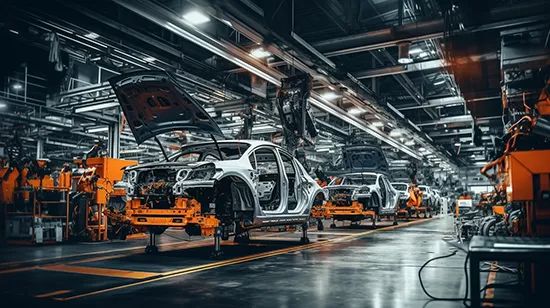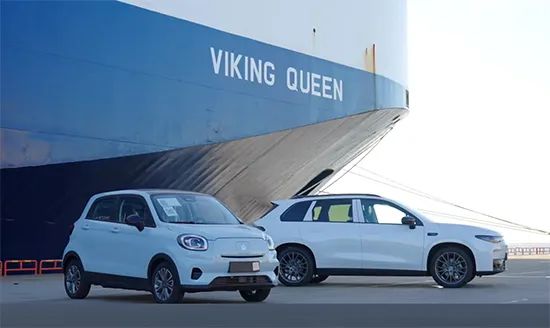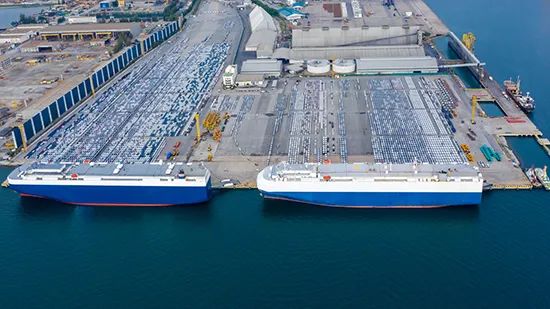The controversy over Volkswagen's plant closures spreads, potentially impacting China's auto exports
![]() 10/11 2024
10/11 2024
![]() 474
474
After the explosion of traffic for Chinese brands at the Beijing Auto Show, multinational automakers have rarely made big moves at domestic auto shows in China, but Herbert Diess, CEO of Volkswagen Group, frequently visits China and even appears on short video live streaming platforms. However, he may now be too busy dealing with the controversy over Volkswagen's plant closures and layoffs to engage in such publicity stunts. The turmoil has plunged the German executive, who is the rare CEO to concurrently lead two companies (Volkswagen and Porsche), into a crisis.
Flashback 30 years ago, Diess was an intern on the Audi production line, and he grew up in Braunschweig, Lower Saxony, where he attended school. Lower Saxony is home to Volkswagen Group's headquarters, and the state government holds a 20% stake in Volkswagen AG. For the Chinese, Volkswagen is essentially a mixed-ownership enterprise with state-owned components. Being a native of Lower Saxony, Diess undoubtedly understands the challenges of closing Volkswagen plants and laying off workers.
Philip Howes, an analyst at German consulting firm Jefferies, told Handelsblatt, "The outcome of the restructuring will determine the fate of Diess and IG Metall Chairman Berthold Huber." He said, "If management fails to close plants, Diess's position will undoubtedly be in question. Similarly, Huber has essentially stated that he will not support plant closures. If plants are closed, he too will be in a difficult position."
Volkswagen threatens the foundations of German industry. 'Too many monks, too little porridge' points to external factors

Wolfsburg, the headquarters of Volkswagen Group, is often translated as "Wolf Castle" in Chinese. According to Chinese standards, it is a small, fourth-tier city akin to China's Tieling, yet it boasts a Bundesliga football team, a luxurious five-star Ritz-Carlton hotel, and an average worker salary that exceeds that of Audi colleagues in Ingolstadt, Bavaria. After the wave of layoffs in the mid-1990s, the company has not faced a crisis in over 30 years. The last CEO to consider such measures, Matthias Müller, was fired by Volkswagen's Supervisory Board years ago, leading frontline employees to believe it would never happen to them. However, with intensifying competition, not only have agreements guaranteeing no layoffs expired, but even century-old plants face closure risks.
On the surface, this seems unrelated to China thousands of miles away, but in reality, the strong competitiveness of Chinese automakers is one of the reasons for the decline in profits and sales of this veteran global automaker. The European Automobile Manufacturers' Association stated in a press release, "The market is declining, and external competitors are increasing, indicating that the pie is getting smaller, but there are more guests at the table." In Chinese idioms, this is akin to "too many monks, too little porridge," and behind it all looms the shadow of Chinese competitors. The current European automotive industry has been in its comfort zone for too long to adapt to revolutionary shocks, fostering resentment towards competitors: It's Tesla, it's Chinese electric vehicles, they're making us lose face.
I visited Wolfsburg twice, in 2004 and 2012. Vivid images etched in my mind include the blue Volkswagen logo on the towering chimney of the century-old factory building, the abundant and hearty dishes in the bright cafeteria reminiscent of an auto showroom, and the go-kart track and cylinder-shaped slide in the Volkswagen Autostadt (similar to a domestic 4A-rated industrial tourist attraction). Handelsblatt noted, "Fewer cafes where one could once leisurely sip coffee now surround the factory, and people have gone from laughter to whispers. Why is this happening?" A Volkswagen works council member told the Financial Times, "Without Volkswagen, there would be no Wolfsburg, and this city would cease to exist. We cannot become Germany's Detroit or Europe's Rust Belt."
As this issue has risen to the level of shaking the lifeblood of the German economy, even the Chancellor and Minister of Economics have begun to inquire. It is highly likely that plant closures will not occur immediately, but who knows? For Chinese automakers venturing abroad, the ripple effects of the Volkswagen plant closure controversy are undoubtedly an important and negative factor that must be taken seriously.
China and Europe move in opposite directions on fuel standards. Will decarbonization plans stall?

Image source: screenshot from Leapmotor's official video
As Volkswagen struggles, so too does the Italian automotive industry. In September, when Chinese media was abuzz with debates over fuel emission standards for 2026, both the Italian Prime Minister and Minister of Industry came forward to immediately halt the proposed Euro 7 fuel standards for 2025 and quickly reevaluate the EU's ban on the sale of new combustion engine vehicles by 2035, using phrases like "shooting oneself in the foot" and "setting a trap for oneself" to warn of the severity of the issue.
Italian Minister of Industry Adolfo Urso told local television, "The roadmap for the Green Deal has shown that it contradicts the collapse of the European electric vehicle market and the severe crisis facing European automakers."
According to data from ANFIA (Associazione Nazionale Filiera Industria Automobilistica), Italian car production fell by more than 30% in the first seven months of this year compared to the same period in 2023. From an energy perspective, electric vehicle sales in Italy declined by 12% from January to August. "Compared to the incomes of Europeans, especially Italians, electric cars are too expensive," Urso warned. "The risk is that we are shifting from a dependence on fossil fuels like oil and gas to a dependence on key raw materials sourced from, produced by, or processed in China."
As if to add weight to the discussion, the European automotive industry is also highly vigilant about Leapmotor, which officially launched at the end of September. Leapmotor's compact electric vehicle T03 has a starting price of €18,900 (compared to €30,000 for the electric version of the comparable Fiat 500) and plans to introduce a new model each year over the next three years. Leapmotor also aims to establish 350 sales points by the end of this year, primarily in Western European markets such as the UK, Belgium, France, and Germany. With its low price and production in Poland within the EU, Leapmotor will have a faster and more potent attack weapon than other Chinese automakers facing high tariffs on imported vehicles. It can even be seen as a pioneer paving the way for the full-scale export of Chinese automobiles to Europe.
"If we don't immediately review and change our ban on combustion engine vehicles, it could trigger upheavals similar to the recent protests by European farmers against the Green Deal," said Urso. "In a few months, we'll see not just farmers driving tractors but also auto workers in Brussels, Strasbourg, and other European capitals. This atmosphere pervades all of Europe."
Ursula von der Leyen, the newly re-elected President of the European Commission, has consistently pursued a misguided path of "de-risking" and a one-sided view of economic and trade relations with China. She has recently expressed a willingness to cooperate with countries like France and Italy that oppose Chinese auto imports and the ban on combustion engine vehicles. In particular, the proposed Euro 7 fuel standards, set to take effect next year, are likely to be postponed. The ban on combustion engine vehicles, originally scheduled for discussion again in 2026, may also be reviewed earlier this year or in early 2025, with the outcome likely to delay or relax the ban, significantly reducing the urgency of market choice. As the penetration rate of electric vehicles in Europe declines, the absence of restrictions on combustion engine vehicles makes switching to electric vehicles an unnecessary expense for European families emerging from inflation. Their desire to choose Chinese automotive products will also diminish significantly.
Difficulties in electric vehicle adoption: Paving the way or tearing down others' bridges

The Volkswagen incident has a profound background: weak overall consumption and a shrinking electric vehicle market in Europe. According to analysis by data group Jato Dynamics, new registrations of electric vehicles in Europe fell by 36% year-on-year in August, the largest monthly decline since early 2017.
From a producer perspective, demand for electric vehicles from Volkswagen, Renault, and Stellantis (which includes Fiat, Opel, Peugeot, Citroën, Jeep, and Chrysler brands) has plummeted, while Chinese automakers and brands have increased their market share in electric vehicle sales from 10.5% last year to 15.5% in August. This may be the largest share increase before the new tariffs take effect.
Felipe Muñoz, a global analyst at Jato, told the media that chronic inflation and tariff concerns have already impacted European consumers' demand for Chinese brands. In August, registrations of MG vehicles from SAIC Motor plunged by 65%. He added, "Since July, tariffs on Chinese electric vehicles and all related reports have had an impact." According to EU customs statistics, Chinese vehicles awaiting delivery after paying new tariff deposits have accumulated in containers at European ports like Bremen, Rotterdam, and Piraeus. A few vehicles have even been stored for over 18 months. To avoid losses from the declining electric vehicle market, Chery and SAIC are now turning to selling more combustion engine and hybrid vehicles in the UK and Europe. However, due to the impact of the Russia-Ukraine conflict, the source of European fuel has shifted to North Africa, significantly degrading fuel quality. In particular, in Central and Southern Europe, some exported new vehicles from domestic brands have even experienced engine component damage from inferior fuel, further impacting combustion engine vehicle sales. It's like pressing down on one end of a seesaw only to have the other end rise up – difficulties abound.
Before considering tearing down others' bridges, Europe has not been without its own attempts to pave the way, nor has it blindly opposed the green transition through electric vehicle development. However, the force and scale of their industrial policies, as well as the efficiency of communication among countries within the union, are relatively low, even inferior to the U.S. Inflation Reduction Act. According to reports, Italy spent nearly €1 billion this year on fiscal incentives to encourage consumers to replace gasoline and diesel vehicles with electric vehicles, especially locally produced ones. However, local media claimed that these incentives were exhausted within nine hours of the program's launch, a mere drop in the ocean.
Numerous factors have hindered progress and fostered a growing atmosphere of failure. CEOs and politicians, seeking to shift blame and appease angry workers, have pointed fingers at competitors like China and the United States for their so-called internal competition and subsidies.
Beyond complaints and sighs, European countries have done little in terms of green energy transition. The construction of charging infrastructure has largely been left to companies like Tesla and NIO. The biggest challenge for domestic products in their early stages was the difficulty and length of charging, compounded by Europe's dual pricing of electricity based on both kilowatt-hours and charging time. Last Christmas, a side-by-side review by Sky News found that BYD's charging costs were 40% higher than Tesla's, which has its own charging infrastructure, erasing much of BYD's purchase price advantage. Europe is also a blank slate when it comes to spreading knowledge about electric vehicle driving and maintenance. An expert on auto exports told me at a forum, "The overall quality of Chinese automobiles exported to Europe and registered for use is satisfactory. However, due to a lack of knowledge among customers and 4S dealerships about electric vehicles, there have been instances of damage caused by improper use. In one severe case, a British car owner towed a flood-damaged vehicle to a 4S dealership for repairs. The after-sales team failed to promptly remove the battery, resulting in a short circuit and spontaneous combustion due to pressure differences causing liquid leakage from the battery. During the holiday season, Western countries generally lack a 996 work culture and on-call systems. The fire raged all night, causing severe damage to the dealership."
The difficulties in electric vehicle adoption have already put pressure on Chinese automakers' overseas expansion. Now, with companies like Volkswagen struggling, they are looking to blame Chinese automakers. This logic is akin to a game of checkers: when one's own path is blocked, blocking and tearing down others' bridges seems like the only option.
On October 4, the European Commission formally approved tariffs on electric vehicle exports from China. Ten member states, including France, Italy, and the Netherlands, voted in favor, with five votes against and 12 abstentions. Although Germany voted against, the impact of the Volkswagen incident on its stance cannot be ruled out. It is understood that the new tariff period is five years, with SAIC Motor bearing the heaviest burden (with a progressive tax rate of 45.3%). In addition to tariffs, the EU has another less harmful but more insulting non-tariff trade barrier at its disposal. According to German weekly magazine Der Spiegel, European automakers have been pinning their hopes on new purchase subsidies of €4,000 per electric vehicle produced, with an additional €2,000 from manufacturers. A crucial aspect is that these subsidies are tied to automakers' carbon footprints. The sinister intention behind this is to speculate or subjectively judge that electric vehicles produced in China emit more carbon than those produced in Europe, perhaps due to the use of coal-fired power generation in the manufacturing process or higher pollutant emissions. Ultimately, Chinese-made electric vehicles could be excluded from subsidy policies or even subject to carbon border taxes.
Returning to the theme of this article, just two days before China's National Day, the first round of negotiations between Volkswagen's labor and management took place in Hanover. After three hours of talks, no agreement was reached, and the question of whether to close plants remained unresolved. On the same day, Lower Saxony's Minister-President Stephan Weil (SPD faction) also called on Volkswagen to explore alternative options in a government statement. On September 30, Volkswagen's works council announced a general strike by no later than December 1.
The impact of the Volkswagen controversy on China's auto exports is indirect but significant. Due to the decline in real estate and insufficient domestic demand, some domestic economists have raised concerns about export resistance stemming from industrial policy spillovers, particularly in the steel, solar panel, and new energy vehicle sectors, at various forums. Therefore, Chinese automakers cannot afford to remain detached and uninvolved in these overseas stories and phenomena, as they can significantly impact various "gray rhino" events and hinder the long-term layout of China's auto exports. In the long run, overseas production is an unavoidable link and even a crucial move to address fundamental issues.
Warfare is deceitful. The realm of life and death, the path of survival and destruction, cannot be overlooked. Facing an international environment more severe and complex than that of Japanese and Korean exports to Europe and America in the past, we must possess the awareness and courage of treading on thin ice, as well as unwavering conviction and enduring patience, to forge ahead fearlessly.
Tips: European Export Battle Report
1. NIO
In the first half of 2024, NIO registered 796 battery electric vehicles (BEVs) in 18 Western European markets (including pre-2004 EU member states, Norway, Switzerland, Iceland, and the UK), representing a year-on-year increase of 0.9% and a market share of 0.1% for BEVs.
According to the passenger car registration data of the German Federal Motor Transport Authority (KBA), NIO registered 35 vehicles in August this year, a year-on-year decrease of 91.5%. From January to August this year, NIO registered 301 vehicles in Germany, a year-on-year decrease of 62.6%. Overall, the number of passenger car registrations in Germany decreased by 27.8% year-on-year in August, of which the number of pure electric vehicle registrations decreased by 68.8% year-on-year.
2, XPENG
Marcus Schurick, head of XPENG Motors Germany, said, "Entering the German market is a major milestone for XPENG Motors, and we are delighted to have a place in the world's most competitive automotive market."
According to statistics, in the first half of 2024, XPENG Motors registered 2,223 pure electric vehicles in 18 Western European markets (including member states that joined the EU before 2004, Norway, Switzerland, Iceland, and the UK), accounting for 0.2% of the market share of pure electric vehicles. Among them, 2,065 were XPENG G9s. According to passenger car registration data from the German Federal Motor Transport Authority (KBA), XPENG Motors registered 33 vehicles in August this year, of which 29 were XPENG G9s. From January to August this year, XPENG Motors registered 80 vehicles, of which 58 were G9s.
Typesetting 丨 Yang Shuo






